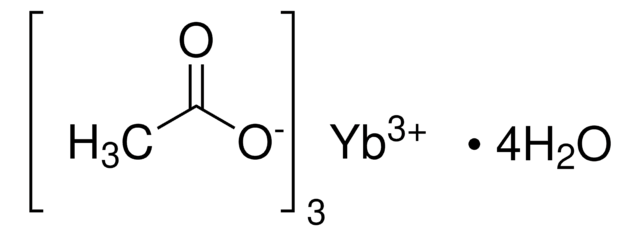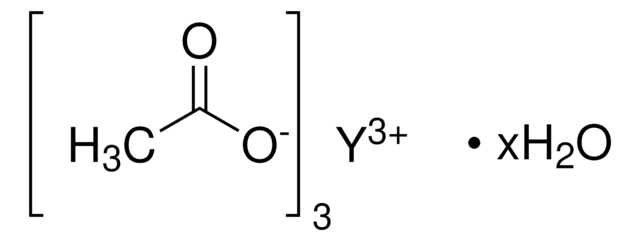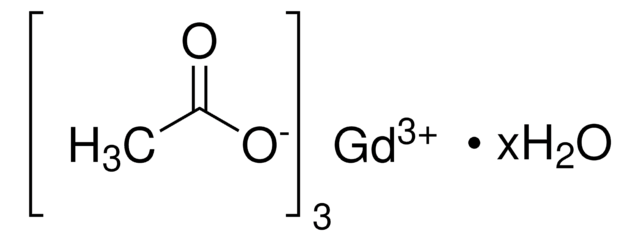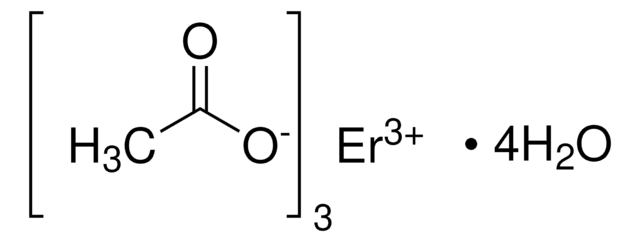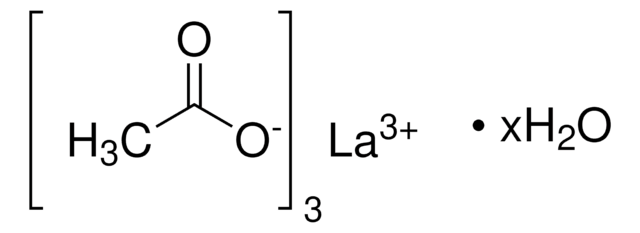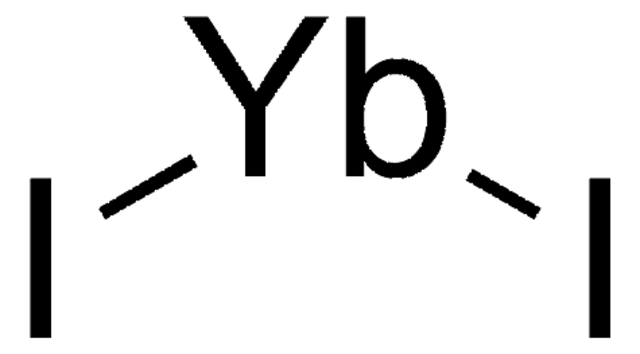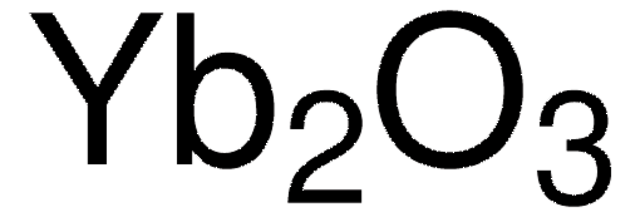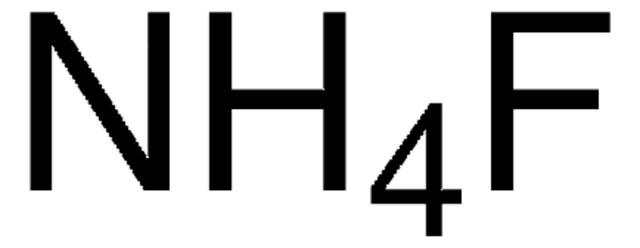544973
Ytterbium(III) acetate hydrate
99.95% trace metals basis
Sinónimos:
Acetic acid ytterbium hydrate
Iniciar sesiónpara Ver la Fijación de precios por contrato y de la organización
About This Item
Productos recomendados
Análisis
99.95% trace metals basis
formulario
powder or crystals
idoneidad de la reacción
core: ytterbium
reagent type: catalyst
cadena SMILES
O.CC(=O)O[Yb](OC(C)=O)OC(C)=O
InChI
1S/3C2H4O2.H2O.Yb/c3*1-2(3)4;;/h3*1H3,(H,3,4);1H2;/q;;;;+3/p-3
Clave InChI
PHWPQNTXTCAARQ-UHFFFAOYSA-K
Aplicación
- Highly luminescent, biocompatible ytterbium (III) complexes as near-infrared fluorophores for living cell imaging: This study highlights the development of ytterbium complexes with enhanced near-infrared luminescence suitable for live-cell imaging, utilizing Ytterbium(III) acetate hydrate as a precursor. The findings demonstrate significant potential for biomedical applications, particularly in imaging techniques sensitive to deeper tissue penetration (Ning et al., 2018).
Código de clase de almacenamiento
11 - Combustible Solids
Clase de riesgo para el agua (WGK)
WGK 3
Punto de inflamabilidad (°F)
Not applicable
Punto de inflamabilidad (°C)
Not applicable
Equipo de protección personal
Eyeshields, Gloves, type N95 (US)
Elija entre una de las versiones más recientes:
¿Ya tiene este producto?
Encuentre la documentación para los productos que ha comprado recientemente en la Biblioteca de documentos.
Los clientes también vieron
Aleksandra Kiseleva et al.
ACS applied materials & interfaces, 11(26), 22962-22972 (2019-06-30)
Spider silk is a natural material possessing unique properties such as biocompatibility, regenerative and antimicrobial activity, and biodegradability. It is broadly considered an attractive matrix for tissue regeneration applications. Optical monitoring and potential control over tissue regrowth are attractive tools
Huihui Wang et al.
Talanta, 197, 558-566 (2019-02-18)
A selective, simple and environment-friendly type fluorescence sensing platform between upconversion nanoparticles (UCNPs) and melanin-like polymer utilizing the photoinduced electron-transfer (PET) mechanism was developed. The effective fluorescence quenching of UCNPs by melanin-like polymers could detect tyramine and tyrosinase (TYR) activity
Agnieszka Noculak et al.
Nanotechnology, 28(17), 175706-175706 (2017-03-08)
Three sets of β-NaGdF
Qianqian Su et al.
Frontiers in chemistry, 8, 836-836 (2020-10-24)
Lanthanide-based upconversion nanoparticles can convert low-energy excitation to high-energy emission. The self-assembled upconversion nanoparticles with unique structures have considerable promise in sensors and optical devices due to intriguing properties. However, the assembly of isotropic nanocrystals into anisotropic structures is a
Wei Kong et al.
Inorganic chemistry, 56(2), 872-877 (2017-01-06)
Lanthanide-doped upconversion nanoparticles with a suitable surface coating are appealing for biomedical applications. Because high-quality upconversion nanoparticles are typically prepared in an organic solvent and passivated by hydrophobic oleate ligands, a convenient and reliable method for the surface modification of
Nuestro equipo de científicos tiene experiencia en todas las áreas de investigación: Ciencias de la vida, Ciencia de los materiales, Síntesis química, Cromatografía, Analítica y muchas otras.
Póngase en contacto con el Servicio técnico